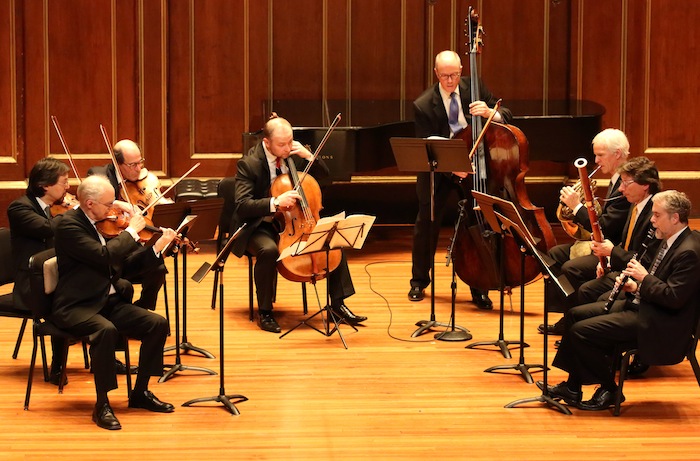Boston Symphony Chamber Players honor a colleague with wide-ranging French program

The Boston Symphony Chamber Players performed Jean Francaix’s Octet Sunday afternoon at Jordan Hall.
The Boston Symphony Chamber Players have always been committed to music both old and new. French music remains a particular specialty, and the ensemble has performed and recorded works by both romantic and modern French masters. That tradition continued Sunday afternoon at Jordan Hall, where the Chamber Players offered works by Taffanel, Saint-Saëns, Françaix, and Tanguy.
The ensemble, consisting of musicians drawn from principal chairs of the BSO, plays together with a fine technical polish and expressive nuance. One player was sadly absent. Jules Eskin, longtime principal cellist with the BSO, passed away this past November. His death has left a void with the Chamber Players in particular, of which he was a founding member. Sunday’s concert was dedicated to his memory.
The newest work on the program was Eric Tanguy’s Afterwards, a twelve-minute work for flute and piano.
Composed in 2012, the piece bears hints of Debussy and bluesy melody. It is also thoroughly colorful. Flutist Elizabeth Rowe coaxed a kaleidoscope of effects from her instrument, ranging from dreamy high tones, dusky low notes, flutter-tongue passages, and phrases of plush velvet.
At the piano, Randall Hodgkinson supplied chords that had just the right touch of prickly dissonance. His playing matched Rowe’s sensitivity, and the pianist conjured harmonies that rang in the air like church bells at a distance.
Other works on the program matched that same expressive grace.
Paul Taffanel is remembered primarily as a flutist. Yet he wrote music that beams with operatic lyricism. That’s surely the case with his Wind Quintet in G minor. Composed in 1876, the work has an impish quality, especially in the outer movements, which recall the fire of Mendelssohn’s music. The Chamber Players played the work with concentration and precision, bringing grace and humor to the outer movements. French hornist Richard Sebring floated a warm solo at the start of the second movement. Flutist Elizabeth Rowe, oboist John Ferrillo, and clarinetist William R. Hudgins traded phrases with each other with fine touch. Richard Svoboda supplied steady bass support.
Saint-Saëns’ Septet for piano, trumpet, and strings, Op. 65 was written as a joke to reflect the name of a musical society called, fittingly, La Trompette. But its humor aside, the work is remarkable for its technical beauty. Drawing upon Baroque and Classical style and forms, the Septet of 1880 seems to look ahead to Stravinskian neoclassicism.
The Chamber Players rendered the work with polish and energy. The strings’ sound took on a warm glow. Pianist Randall Hodgkinson handled the trickling piano part of the last movement with crispness, supplying the repetitions of the theme with trills and flourishes. The hero of this performance was Thomas Rolfs, who played the trumpet part with clarion tone and smooth blend when called upon. His fanfare figures, which took him to a bright high E-flat, brought the work to a rousing conclusion.
If Saint-Saëns’ Septet looked forward, Jean Françaix’s Octet looked backwards. Born in 1912, the French composer lived the same long life as John Cage. But his style couldn’t be more different.
His Octet, commissioned for the Vienna Octet in 1972, recalls popular music of the nineteenth century. The slow introduction and Andante movement are imbued with the tender melody of a parlor song while lower strings add harmony rich in chromaticism. The final movement is a waltz that drips with the nostalgia of a Viennese dance hall.
Elsewhere the piece bounces with a wry humor. The first movement and Scherzo are woven from sprightly themes that dart about the ensemble. Françaix’s music has been a favorite of the Chamber Players in recent seasons, and the ensemble played the piece with idiomatic flair and sensitive musicality.
To open the concert, Malcolm Lowe and Steven Ansell played the slow movement from Mozart’s Duo in B-flat for violin and viola in memory of Eskin. The cellist’s legacy, displayed brilliantly by the Chamber Players, will live on.
The next concert by the Boston Symphony Chamber Players will feature soprano Elizabeth Fischborn and pianist David Deveau in music by Jolivet, Lerdahl, Prokofiev, Crozier, and Brahms 3 p.m. April 2 at Jordan Hall. bso.org; 888-266-1200
Posted in Performances




